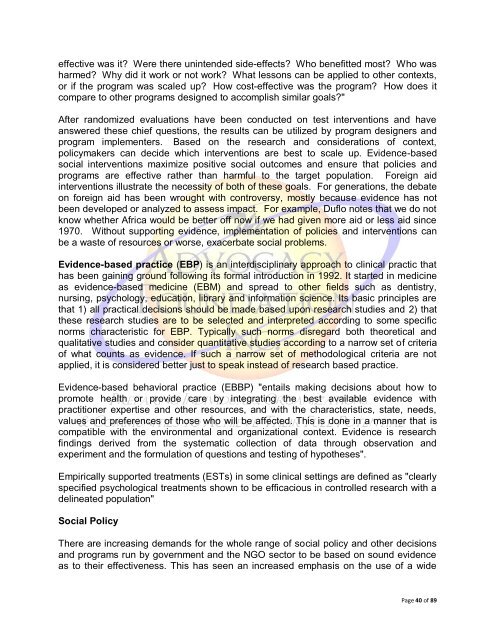The EDTC Incubator
The EDTC Incubator
The EDTC Incubator
You also want an ePaper? Increase the reach of your titles
YUMPU automatically turns print PDFs into web optimized ePapers that Google loves.
effective was it? Were there unintended side-effects? Who benefitted most? Who was<br />
harmed? Why did it work or not work? What lessons can be applied to other contexts,<br />
or if the program was scaled up? How cost-effective was the program? How does it<br />
compare to other programs designed to accomplish similar goals?"<br />
After randomized evaluations have been conducted on test interventions and have<br />
answered these chief questions, the results can be utilized by program designers and<br />
program implementers. Based on the research and considerations of context,<br />
policymakers can decide which interventions are best to scale up. Evidence-based<br />
social interventions maximize positive social outcomes and ensure that policies and<br />
programs are effective rather than harmful to the target population. Foreign aid<br />
interventions illustrate the necessity of both of these goals. For generations, the debate<br />
on foreign aid has been wrought with controversy, mostly because evidence has not<br />
been developed or analyzed to assess impact. For example, Duflo notes that we do not<br />
know whether Africa would be better off now if we had given more aid or less aid since<br />
1970. Without supporting evidence, implementation of policies and interventions can<br />
be a waste of resources or worse, exacerbate social problems.<br />
Evidence-based practice (EBP) is an interdisciplinary approach to clinical practic that<br />
has been gaining ground following its formal introduction in 1992. It started in medicine<br />
as evidence-based medicine (EBM) and spread to other fields such as dentistry,<br />
nursing, psychology, education, library and information science. Its basic principles are<br />
that 1) all practical decisions should be made based upon research studies and 2) that<br />
these research studies are to be selected and interpreted according to some specific<br />
norms characteristic for EBP. Typically such norms disregard both theoretical and<br />
qualitative studies and consider quantitative studies according to a narrow set of criteria<br />
of what counts as evidence. If such a narrow set of methodological criteria are not<br />
applied, it is considered better just to speak instead of research based practice.<br />
Evidence-based behavioral practice (EBBP) "entails making decisions about how to<br />
promote health or provide care by integrating the best available evidence with<br />
practitioner expertise and other resources, and with the characteristics, state, needs,<br />
values and preferences of those who will be affected. This is done in a manner that is<br />
compatible with the environmental and organizational context. Evidence is research<br />
findings derived from the systematic collection of data through observation and<br />
experiment and the formulation of questions and testing of hypotheses".<br />
Empirically supported treatments (ESTs) in some clinical settings are defined as "clearly<br />
specified psychological treatments shown to be efficacious in controlled research with a<br />
delineated population"<br />
Social Policy<br />
<strong>The</strong>re are increasing demands for the whole range of social policy and other decisions<br />
and programs run by government and the NGO sector to be based on sound evidence<br />
as to their effectiveness. This has seen an increased emphasis on the use of a wide<br />
Page 40 of 89

















